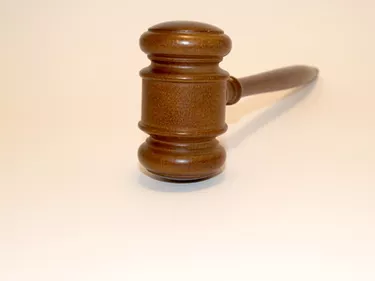
A lawsuit provides a civil method by which a business or individual can seek justice for a real or supposed wrong. The court then determines liability for the incident in question and, if the plaintiff wins the case, awards him a monetary judgment. While the act of being sued does not in itself affect your credit score, losing a lawsuit does.
How It Works
Video of the Day
A judgment the court levies against you becomes a part of your county's public record. The credit bureaus routinely pull and evaluate court records for new entries. When this occurs, the public record will appear on your credit report.
Video of the Day
A public record of a judgment notes that you owe money to another party that you failed to pay – forcing that business or individual to seek legal recourse against you. Because of this, judgments have a derogatory effect on your credit scores. Unfortunately, because everyone's credit information differs, there is no way to estimate the negative impact a judgment will have on your credit scores.
Time Frame
Judgments on your credit report do not follow the standard seven-year reporting period for derogatory information. Rather, the Fair Credit Reporting Act notes that, once the credit bureaus insert a judgment, the judgment will remain until the statute of limitations for enforcing the judgment expires. Each state has different laws regarding how long judgment creditors have to enforce their judgments. The adverse information appears on your credit report for the full duration of this period.
One exception to the rule occurs if your state statute of limitations for enforcing judgments is shorter than the seven-year standard reporting period. Should this occur, the judgment appears on your credit report for seven years from the date the court entered its decision in the public record.
Paying the Judgment
When you pay off a creditor's judgment, the creditor files paperwork with the court noting that you satisfied the judgment. The court then updates the public record to reflect the new information and, subsequently, the credit bureaus update your credit report. While paying a judgment does not remove it from your credit report or boost your credit rating, it does look better to prospective lenders that you satisfied your legal obligation to your previous creditor rather than ignoring the debt altogether.
Lawsuit vs. Judgment
The results of a lawsuit vary depending on the parties involved, the case itself and the judge who hears the case. Thus, there is no guarantee that a business or individual who sues you will obtain a judgment by doing so. If you win the case, no record of a judgment appears on your credit report and your credit score remains unaffected. The court does not enter the fact that you were sued on the public record if it did not award a judgment to the plaintiff.